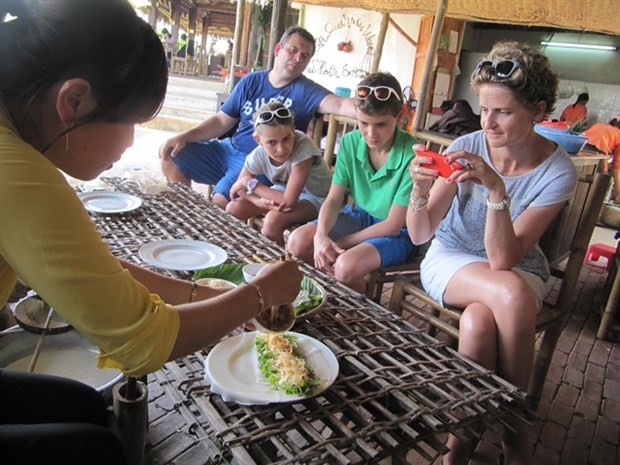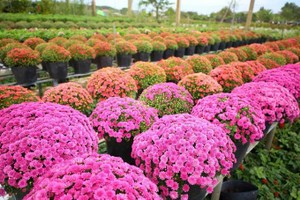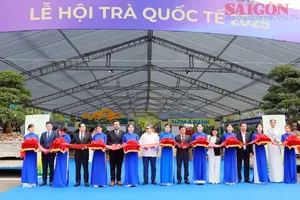 A French family visits a farm in Hoi An. Farm lifestyle experiences are an option for tourists after an Old Quarter visit.(Photo: VNA)
A French family visits a farm in Hoi An. Farm lifestyle experiences are an option for tourists after an Old Quarter visit.(Photo: VNA)
A recent survey from Quang Nam’s provincial tourism association unveiled that 95 percent of 200 tourism businesses called for access to bank loans and preferred rates, eased debt payments, tax reductions, human resources and infrastructure investment.
Huynh Thi Minh from the Hoi An tourism human resources club said 65 proposals from hotel owners, travel agencies and tourism service suppliers focused on financial assistance, market promotions, and refreshing Hoi An's tourism brand.
“Local businesses proposed refreshing solutions for Hoi An including more new destinations and shopping areas outside of the Old Quarter and boosting the use of environment-friendly transport vehicles,” Minh said. “They also called for a limit on commercialising and harassing tourists in the Old Quarter, while promoting the traditional lifestyle of local people in Hoi An, and more pedestrian streets.”
It needs destinations for tourists from Asia, the US and Australia as well as the emerging markets of India, the Republic of Korea and France, she added.
Nguyen Thi Minh Phuong from the Quang Nam provincial tourism department said 65 percent of tourism services had resumed, but only 56,000 foreign tourists out of 1.5 million had visited the province in the first half of 2022.
Hoi An was seen as a favourite destination in Vietnam when the UNESCO-recognised world heritage site hosted 60 percent of total visitors (7 million in 2019) in Quang Nam province, she said.
Nguyen Son Thuy, general secretary of the Quang Nam Tourism Association, said local businesses had not yet fully recovered from the Covid-19 ‘shock’.
“Almost all travel businesses approached banks to help them ease pre-Covid-19 debt, while the workforce found new jobs in factories or home businesses. 90 percent of tourism enterprises in Hoi An have been struggling for survival,” Thuy said.
He said Vietnam had hosted a record 18 million international tourists in 2019, of which 67 percent were from China and the RoK, but the number of tourists from these two major markets had not yet recovered due to pandemic lockdown policies.
“The Chinese market has not yet fully opened, and only individual tours were booked from the RoK. Resorts and hotels in Vietnam have hosted only a sixth of the previous number of tourists in 2019,” he explained. “We should arrange specific tour services and destinations for Indian tourists. Hoi An could offer various options for tourists from India and the RoK.”
Pham Chuong Hoang, an expert from the national economics university, said good products, high-quality human resources, digital transformation, and tourism promotions were crucial proposals from local tourism businesses that would help them be ‘healthy’ again from a two-year pandemic illness.
“There should be visa extensions from one month to six months for longer stays, home-stay service promotion, and seeking more new markets,” Hoang said.
“The domestic market was seen as a solution for the post Covid-19 tourism recovery plan, but high season time (summertime) is over and the market in Asia Pacific declined 70 percent,” he said. “Tourism in Hoi An and Quang Nam has been refreshing its products by promoting ‘green’ tourism, ‘safe’, environment-friendly tour services. The Covid-19 damage also has forced Hoi An tourism restructuring and diversifying.”
Tran Quoc Quan from the Quang Nam Provincial department of labour, invalid and social affairs said nearly 1 million labourers in the province were infected with Covid-19 in 2020-2021, of which 30,000 were self-employed persons and tourism workers in Hoi An.
Reductions of insurance fees and allowances had been provided to thousands of businesses and unemployed workers in the tourism sector, he added.
Hoi An and My Son Sanctuary – two UNESCO World Heritage sites – and the world biosphere reserve of the Hoi An-Cham Islands in Quang Nam province are among the favourite destinations of foreign tourists in Vietnam along with Thua Thien-Hue, Quang Binh, Da Nang, and Phu Quoc island in Kien Giang province.
























